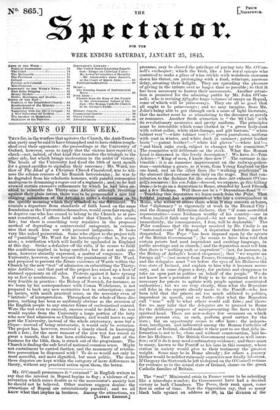NEWS 0-1 1 ; :THE WEEK.
Taus far, in the warfare that agitates the Church, the Anti,Tra.cta- -riari party maybe said-0 liave-triumphed and to hale ridden rough- shod over their opponents : the:Proceedings at the University of Oxford. however, seem to' that the victors have received a check—not, indeed, of that kind'that transfers the triumph to-the other side, but which brings moderation in the midst of victory. The heads of the University-had fixed the: 13th of next month for a grand sacrifice to signalize their successes :' Mr:" Ward, au- thor of The Ideal of a 'aristian Church. Considered, was to wit- ness the sOlemn censure of his Romish heterOdoXieas;, he was to ;be 4w4cled frowhis- scholastic honours, with •painful ceremonies analogous to drumming a rogue out of a regiment ; and; as hehad avowed certain excessive refinements by which he , had been en- abled to subscribe the Thirty-nine Articles although- revolting against their plain intent, there was to be propounded a new law obliging subscribem of the Articles,to make a deekg
fiatirth : the specific meaning which they attached to the en o
censure a departure from standards of faith based on the same foundation as the Universities themselves, would seem fair enough; to deprive one who has ceased to belong to the Church as at pre- sent constituted, of offices held under that Church, also seems fair ; but there is something very repulsive in the proposed method of degrading a controversial antagonist, in ceremo- nies that mark him out with personal indignities. It looks very like naked persecution. Some who object to the project talk of 'punishing' Mr. Ward for his heterodoxy—that is' for opi- nion; a retribution which will hardly be applauded in England at this day. Strike a defaulter off the rolls, if he ceases to fulfil the conditions implied in being enrolled ; but do not make opi- nion, - however absurdly expressed, a matter of vengeance. The University, howeVer, went beyond the punishment of Mr. Ward, and proposed to prevent the future existence of Wards within the Church by the new "test" of admission on subscribing the Thirty- nine Articles ; and that part of the project has raised up a host of alarmed opponents on all sides. Protests against it have sprung up as fast as mushrooms. Nor, if carried as a law, would it be very feasible in practice : the Bishop of Norwich, for instance, as we learn by his correspondence with Canon Wodehouse, is not prepared to back any new restrictive test in subscription ; since he insists, with much practical sense, on the necessity even of "latitude" of interpretation. Throughout the whole of these dis- putes nothing has been so uniformly obvious as the aversion of the English people to any stricter forms of ecclesiastical control. Were the test even to succeed, success would be defeat : the test would repulse frOm the University a large portion of the laity who now find admission as Churchmen; and would leave to sup- port the University, instead of the whole aristocracy, none but a clique—instead of being aristocratic, it would only be sectarian. The project has, however, received a timely check in hastening such a fate ; for the mere rumour of the new test has raised so great a tumult, that it has been withdrawn. That part of the business for the lath, then, is struck out of the programme. The Church is finding the safe level of national common sense. Might not curtailment be carried further, and the mummery of retribu- tive persecution be dispensed with ? To do so would not only be most merciful; and most dignified, but most politic. The more these disputes are kept within the category of mere differences in theory, without any practical action upon them, the better.


























